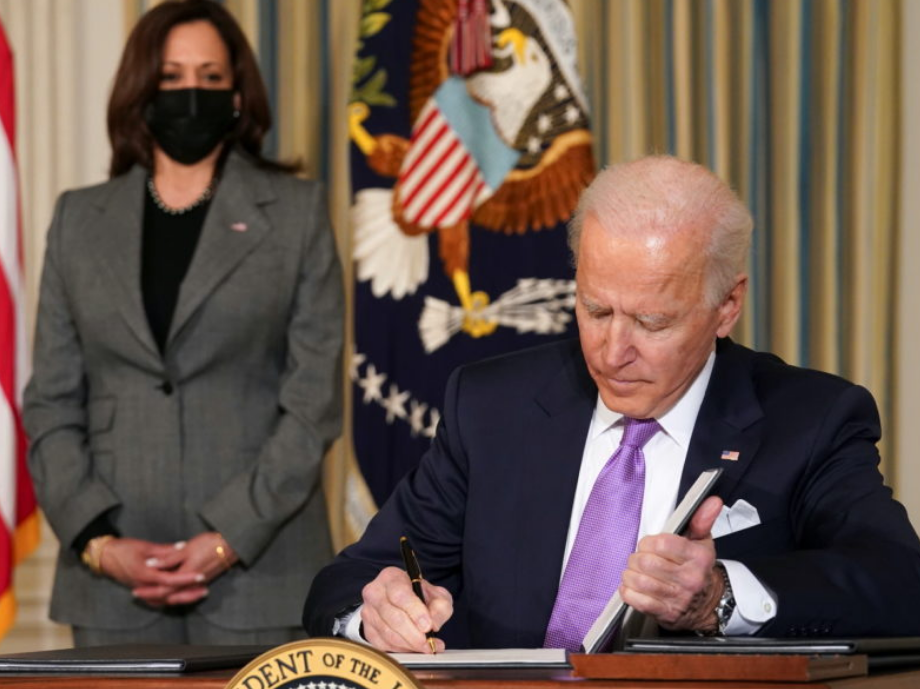
- Details
- By Native News Online Staff
WASHINGTON — As part of his racial and equality initiative, President Joe Biden on Tuesday signed a Presidential Memorandum that reaffirms tribal sovereignty through tribal consultation.
Speaking in more general terms about the racial divide that exists in the country, Biden said the nation faces deep racial inequities in America.
“In my campaign for President, I made it very clear that the moment had arrived as a nation where we face deep racial inequities in America and system — systemic racism that has plagued our nation for far, far too long,” Biden said.
Related: Biden Makes Good on His Promises to Indian Country
Specific to American Indian tribes, the president spoke about respect for tribal sovereignty that was weakened during the Trump administration.
“Today, I'm directing the federal agency to reinvigorate the consultation process with Indian tribes. Respect the tribal sovereignty — respect for tribal sovereignty will be a cornerstone of our engaging with Native American communities,” President Biden said.
The Presidential Memorandum directs federal agencies to complete the following actions: 1) consult with tribal nations to develop and then submit detailed tribal consultation action plans to the Assistant to the President for Domestic Policy (APDP) and the Office of Management and Budget (OMB) within 90 days; 2) designate an agency official to coordinate implementation of the plan and prepare progress reports; 3) submit to the Director of OMB annual progress reports on the status of each action plan; and 4) for the Director of OMB, in coordination with APDP, to submit to the President a report on the implementation of Executive Order 13175.
The National Congress of Americans (NCAI) was quick to compliment Biden on his action.
“In his first week in office, President Biden has demonstrated that the needs of tribal nations are an urgent priority for his administration. I am both excited and encouraged that the Biden Administration is taking so many meaningful and significant steps towards Tribal Nations' priority issues -- respect for sovereignty, racial equity, urgent action on climate change, protection of sacred sites and ancestral ecosystems, and the commitment to meaningful Tribal consultation,” NCAI President Fawn Sharp said.
“There's immense work still to be done, but we celebrate that the first steps President Biden has taken towards truth and reconciliation with tribal nations are so responsive to our needs and aligned with our values and principles,” Sharp continued.
Praise also came from the National Center for American Indian Enterprise Development (National Center).
“Representation matters. President Biden has expressed time and again his commitment to build an Administration that looks like America and works for all Americans. He has already followed through on his promises, including the nomination of Congresswoman Deb Haaland for Secretary of Interior and today’s executive order strengthening its commitment to tribal sovereignty and tribal consultation, the National Center’s CEO Chris James said in a comment to Native News Online. “The fact that this executive order is coming within one week of his Inauguration is not lost on the National Center the rest of Indian Country. We look forward to working with the President and his Administration to advance an agenda that works for Native Americans and Alaska Natives, including Native-owned businesses.”
Rep. Raúl M. Grijalva (D-Ariz.), chair of the House Natural Resources Committee and a champion of Indian Country’s causes in Congress, weighed in on the president’s action.
“President Joe Biden’s executive order signaling a renewed federal respect for tribal sovereignty, strengthening the government-to-government relationship between the federal government and American Indian and Alaska Native tribes, furthering self-determination, and advancing racial justice for tribal communities,” Grijalva said.
“The Trump administration’s blatant disregard of the federal government’s treaty and trust responsibilities to tribal governments has harmed tribal communities for the past four years. We witnessed significant sacred ancestral sites blown to bits and federal protections wrongly stripped from sacred lands. In addition, we saw the failure of federal public health guidance during the pandemic result in the loss of tribal elders and community members. Tribes must always have the seat at the table. To prevent further loss and advance the president’s goals even further, I’m working with my colleagues to pass my RESPECT Act to codify this requirement and ensure that tribes are proactively consulted.”
More Stories Like This
Native News Weekly (August 25, 2024): D.C. BriefsNavajo Utah Commission Approves Six New Weather Stations
First Peoples Fund Announces 2026 Cultural Capital Fellows
Deb Haaland Campaign Responds to Why Her Name is in the Epstein Files
Cadiz, Inc. Announces EPA Selection of Mojave Groundwater Bank Northern Pipeline Project for WIFIA Loan Application
Help us defend tribal sovereignty.
At Native News Online, our mission is rooted in telling the stories that strengthen sovereignty and uplift Indigenous voices — not just at year’s end, but every single day.
Because of your generosity last year, we were able to keep our reporters on the ground in tribal communities, at national gatherings and in the halls of Congress — covering the issues that matter most to Indian Country: sovereignty, culture, education, health and economic opportunity.
That support sustained us through a tough year in 2025. Now, as we look to the year ahead, we need your help right now to ensure warrior journalism remains strong — reporting that defends tribal sovereignty, amplifies Native truth, and holds power accountable.
 The stakes couldn't be higher. Your support keeps Native voices heard, Native stories told and Native sovereignty defended.
The stakes couldn't be higher. Your support keeps Native voices heard, Native stories told and Native sovereignty defended.
Stand with Warrior Journalism today.
Levi Rickert (Potawatomi), Editor & Publisher

